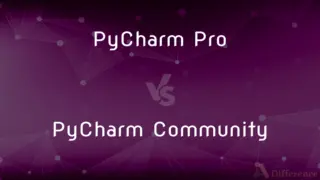Diva vs. Princess — What's the Difference?
By Tayyaba Rehman & Fiza Rafique — Updated on May 2, 2024
Diva generally refers to a celebrated female singer or a woman of outstanding talent in the world of opera, while princess denotes a female royal member, often the daughter or granddaughter of a king or queen.

Difference Between Diva and Princess
Table of Contents
ADVERTISEMENT
Key Differences
A diva is traditionally a distinguished female opera singer whose talent and performances have garnered widespread acclaim, characterized by her powerful voice and commanding stage presence. On the other hand, a princess is a title used in monarchies to describe a female royal family member, typically connected to the lineage or marriage into the royal family.
Diva can also imply a woman who is very successful and famous outside of opera, particularly in other music genres or show business, where she is celebrated for her exceptional skills and prima donna behavior. Whereas a princess's role and recognition are often tied to her birthright or marital connection to a monarchy, shaping her public duties and societal expectations.
In modern contexts, "diva" has evolved to describe someone who may be perceived as temperamental or demanding, often expecting high levels of attention or service. Conversely, "princess" can sometimes be used colloquially to refer to someone treated with excessive care or privilege, or who behaves as if she deserves such treatment without the associated royal status.
The term diva is used across various cultural landscapes to denote a woman with outstanding abilities in her field, often associated with a strong, independent personality. In contrast, princess is firmly embedded in historical and cultural traditions of royalty and often carries connotations of elegance, decorum, and responsibilities associated with her position.
Despite their differences, both terms can be used metaphorically in popular culture to denote high status or exemplary qualities in women, albeit in very different contexts. A diva is celebrated for her formidable talent and strong individuality, while a princess is often idealized for her grace, lineage, and the fairy-tale qualities attributed to her life.
ADVERTISEMENT
Comparison Chart
Definition
A celebrated female singer in opera; a woman of outstanding talent.
A female royal, often a daughter or granddaughter of a monarch.
Connotation
Positive in terms of talent, negative when referring to behavior.
Generally positive, associated with royalty and elegance.
Cultural Context
Common in entertainment and music industries.
Tied to historical monarchies and traditional roles.
Modern Usage
Can denote a high-maintenance or outstanding individual in any field.
Often used to describe someone pampered or privileged.
Symbolism
Represents independence and exceptional talent.
Symbolizes heritage, grace, and responsibilities of royal life.
Compare with Definitions
Diva
A woman of outstanding talent in any field.
She's a real diva in the culinary world.
Princess
Used to describe a woman or girl regarded with affection.
Her father called her his little princess.
Diva
Someone with a reputation for being temperamental.
Her diva demands made the news during the concert tour.
Princess
Represents someone born into or marrying into royal privilege.
She became a princess through her marriage to the prince.
Diva
A celebrated female performer in the music industry.
Known as a pop diva, her albums topped the charts.
Princess
Colloquially used for someone pampered or spoiled.
She's treated like a princess by everyone at work.
Diva
A leading female opera singer.
She aspired to be a diva, captivating audiences with her voice.
Princess
A female member of a royal family, especially a daughter of the king and queen.
The princess is third in line to the throne.
Diva
Used metaphorically for someone insisting on special treatment.
She acts like a diva when it comes to her coffee orders.
Princess
Often associated with fairy tales and stories.
The princess in the story was beloved by all.
Diva
A diva (; Italian: [ˈdiːva]) is the Latin word for a goddess and can also refer to a celebrated female singer; a woman of outstanding talent in the world of opera, and by extension in theatre, cinema and popular music. If referring to an actress the meaning of diva is closely related to that of prima donna.
Princess
Princess is a regal rank and the feminine equivalent of prince (from Latin princeps, meaning principal citizen). Most often, the term has been used for the consort of a prince, or for the daughter of a king or prince.
Diva
An operatic prima donna.
Princess
A woman member of a royal family other than the monarch, especially a daughter of a monarch.
Diva
A very successful singer of nonoperatic music
A jazz diva.
Princess
A woman who is a ruler of a principality.
Diva
(Slang) A person who demands that attention be paid to their needs, especially without regard to anyone else's needs or feelings.
Princess
A woman who is a hereditary ruler; a queen.
Diva
Any female celebrity, usually a well known singer or actress.
Princess
A noblewoman of varying status or rank.
Diva
A person who may be considered or who considers herself (or by extension himself) much more important than others, has high expectations of others and who is extremely demanding and fussy when it comes to personal privileges.
Princess
The wife of a prince.
Diva
A prima donna.
Princess
A woman regarded as having the status or qualities of a princess.
Diva
A distinguished female operatic singer; a female operatic star
Princess
Designed to hang in smooth, close-fitting, unbroken lines from shoulder to flared hem
A princess dress.
Princess
A female member of a royal family other than a queen, especially a daughter or granddaughter of a monarch.
Princess
A woman or girl who excels in a given field or class.
Princess
A female ruler or monarch; a queen.
Princess
The wife of a prince; the female ruler of a principality.
Princess Grace was the Princess of Monaco.
Princess
A young girl; used as a term of endearment.
Princess
A young girl or woman (or less commonly a man) who is vain, spoiled or selfish; a prima donna.
Princess
A tinted crystal marble used in children's games.
Princess
A type of court card in the Tarot pack, coming between the 10 and the prince (Jack).
Princess
A female lemur.
Princess
A female prince; a woman having sovereign power, or the rank of a prince.
So excellent a princess as the present queen.
Princess
The daughter of a sovereign; a female member of a royal family.
Princess
The consort of a prince; as, the princess of Wales.
Princess
A female member of a royal family other than the queen (especially the daughter of a sovereign)
Common Curiosities
How does the connotation of princess differ in modern culture compared to traditional roles?
Traditionally, it denotes royalty and grace, but in modern slang, it can also suggest someone overly pampered or privileged.
What is the primary profession associated with a diva?
Diva is primarily associated with being a distinguished opera singer.
What responsibilities does a princess typically have?
A princess often has duties that include public appearances, charity work, and upholding the customs of her royal family.
Can the term princess apply to anyone outside of royal families?
While it generally refers to women in royal families, "princess" can be affectionately used to refer to any girl or woman regarded as special.
What does it take to be considered a diva in today's music industry?
Outstanding vocal talent, unique style, and often a strong public persona are required to be considered a diva.
Can a princess hold any political power?
In some monarchies, princesses may hold ceremonial or symbolic roles but generally do not have significant political power.
How do divas influence fashion and culture?
Divas often set trends in fashion and influence cultural norms due to their high visibility and iconic status.
Is being called a diva typically a compliment?
It can be both; as a compliment, it refers to her outstanding talent, but it might also imply high maintenance or difficult behavior.
What makes someone a diva in the workplace?
Someone exceptionally talented and possibly demanding high standards or special treatment can be termed a diva in the workplace.
How does fairy-tale imagery influence the perception of a princess?
Fairy tales often portray princesses as characters of beauty, grace, and virtue, influencing how people view real-life princesses.
How has the role of a princess changed in contemporary royal families?
Contemporary princesses often engage more actively in social and humanitarian issues compared to historical counterparts.
Is the title of princess always inherited?
Typically, it is inherited, but it can also be bestowed by marriage into a royal family.
Do divas in the entertainment industry always come from musical backgrounds?
While many are celebrated singers, divas can also emerge from other areas of entertainment, such as film or theater.
What are the most famous roles for a diva in opera?
Roles like Violetta in "La Traviata" or the title role in "Tosca" are iconic for divas.
What challenges do modern princesses face?
They often face the challenge of balancing traditional roles with modern expectations and media scrutiny.
Share Your Discovery

Previous Comparison
Prevalence vs. Ratio
Next Comparison
Liaise vs. CoordinateAuthor Spotlight
Written by
Tayyaba RehmanTayyaba Rehman is a distinguished writer, currently serving as a primary contributor to askdifference.com. As a researcher in semantics and etymology, Tayyaba's passion for the complexity of languages and their distinctions has found a perfect home on the platform. Tayyaba delves into the intricacies of language, distinguishing between commonly confused words and phrases, thereby providing clarity for readers worldwide.
Co-written by
Fiza RafiqueFiza Rafique is a skilled content writer at AskDifference.com, where she meticulously refines and enhances written pieces. Drawing from her vast editorial expertise, Fiza ensures clarity, accuracy, and precision in every article. Passionate about language, she continually seeks to elevate the quality of content for readers worldwide.













































